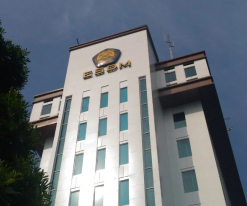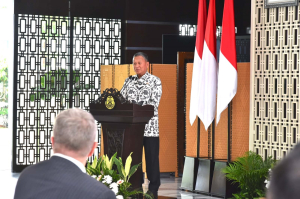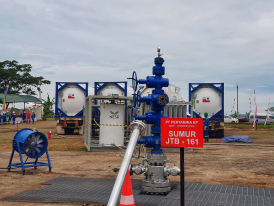Demand for nickel to continuously increase in the future: Experts
Experts and observers in the energy and mining industries have expressed their confidence on the prospect of nickel use in the future, while citing that this typical silvery metal with its corrosion resistant capacity at high temperatures is used in a variety of industries.
"Nickel is most widely used today not for batteries [only about 3 percent], but by other industries such as the military, automotive and health. It's just that, the projected use of nickel for batteries will continue to increase,” Chairman of the Mining Strategic Studies Division at the Indonesian Mining Experts Association (PERHAPI), Mohammad Toha, told a webinar on the prospect of nickel in Indonesia co-organized by Jurist Resia & Co and suaraenergi.com on Monday, February 5, 2024.
With the prospect of so many uses, Toha believes that there is a need for nickel governance in Indonesia that will ensure good supply and demand arrangements, a good condition that will help maintain price stability.
“In oil we have OPEC as a regulator, then in nickel there will also have to be one such regulator. Because we have to bear in our mind that nickel will definitely be needed as long as the reserves are still there," he said.
Downstream expert and founder of the Indonesian Institute for Mineral and Metal Industries (IM2I), Raden Sukhyar, encouraged Indonesia to be more advanced in utilizing the abundant nickel reserves in Indonesia.
“It is no longer just about the upstream sector, but it is time to also take part in the downstream,” Sukhyar said.
He is infuriated by the fact that Indonesia does not yet have a state-owned or private company that can be used as an icon capable of producing derivative goods from nickel raw materials.
"Indonesia should be a decisive country, not just a follower of developed countries like China," Sukhyar, former Director General of Mineral and Coal at the Ministry of Energy and Mineral Resources, said..
According to Mr Sukhyar, this is also due to the lack of regulatory interconnection between government agencies. As a result, upstream policies are often out of sync with downstream policies.
He suggested the need to revise the SOE Law to provide a loophole for SOE companies to emerge as innovators, not just companies that are forced to seek profits.
"China has done that. So we need institutional reform of SOEs," he said further.
Energy observer from Yogyakarta-based Gadjah Mada University, Fahmy Radhy said the government should focus on downstreaming despite having repeatedly received rejection from foreigners.
“Downstreaming is expected not only to bring benefits to investors as what is happening now is that investors are getting more prosperous while the community is less affected. This must be changed in my opinion," said Fahmy.
Meanwhile, Legal and mining expert Ahmad Redi highlighted the importance of paying attention to a number of aspects such as economic transition, food, and the environment, when talking about downstreaming.
“The reason is not to let the nickel boom become a boomerang for the community around the mining sites,” Redi said.
"The economy in a mine-producing area must be maintained and must be unstable when the mining products have run out," he added.
Therefore, Redi encouraged harmonization, synchronization and coordination in all sectors to strengthen downstreaming. "So in terms of regulations, there must be strong alignments," he said.
Tag
Already have an account? Sign In
-
Start reading
Freemium
-
Monthly Subscription
30% OFF$26.03
$37.19/MonthCancel anytime
This offer is open to all new subscribers!
Subscribe now -
Yearly Subscription
33% OFF$228.13
$340.5/YearCancel anytime
This offer is open to all new subscribers!
Subscribe now






